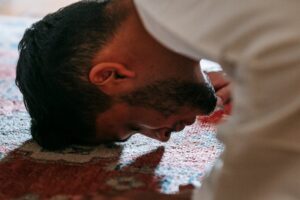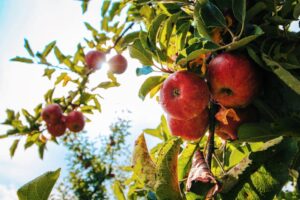{You are the best Community ever brought forth for [the good of] humankind: You enjoin what is right. And you forbid what is wrong. And you believe in God.} 3:110.
This verse was revealed after the companions of the prophet (SAAW) migrated to Medinah, leaving behind the only home most of them had ever known, as well as family and friends, and most of their possessions, all willingly sacrificed in support of the truth they believed in. The Arabic term {you believers} [كنتم] refers to the pre-existing knowledge of God that the Community of believers are meant to be the best of nations, even if the message of prophet Mohammad (SAAW) was the last of the revelations. It also means that the Community of believers earned such a status by the type of effort and sacrifices put forth to reach this level of rightfulness and righteousness. Such a level of righteousness is continuous as long as conditions described in the same verse were met. Omar (RAA) said: “If one wishes to be included in this Community let him maintain the conditions mentioned.”
Being the best of Communities [خير أمة] is not based on one’s color, ethnicity or race, but rather in preserving the ethics and values of goodness defined by God. Prophet Mohammad’s (SAAW) ability to preserve such understanding earned the Muslim Community the share of two thirds of the total population in Heaven. Prophet Mohammad (SAAW) said: “People of Heaven are 120 lines [levels], 80 of them are of this nation and 40 of other nations.”
Muslims refer to the honor of righteousness they are in as a gift from God. That is why the term {brought forth} [أخرجت] was mentioned, it was meant to refer to the One who granted it, Allah (SW). In one example, when the companion Ribii’ Ibn Amer (RAA) met the general of the Persian army Rustom and was asked: “What brought you out from the desert?” Ribii’ Ibn Amer’s (RAA) reply did indeed reflect the honor of being brought forth as gifted from God: “We are people brought forth by God to bring people out from worshiping each other to worship One God.”
Interestingly, the verse mentioned {humankind} using the term [للناس] which originates linguistically to two roots in the Arabic language. One means to forget and the other means to avoid loneliness. Under these two meanings, Muslims are meant to remind people about God, and at the same time keep them company in the journey of life.
Many people interpret the term [تأمرون] {to enjoin} as using authority, but that cannot be suitable all the time. In one of the stories when the prophet (SAAW) had Abu Sufian tied with a rope while entering Makkah and Abu Sufian saw the number of the Muslim army and how well it was equipped, he said: [لقد أمِرَ أمْرُ بن أبي كبشة] “The matter of the son of Abu Kabsha[1] has grown [risen] big.” In this statement, Abu Sufian used the Arabic term [أمر] in a way of glorifying matters not authority. Such an interpretation can also relate that our responsibilities in D’awah for the truth is to act on and glorify good to people rather than forcing them on it, for Allah said in the Quran there is no compulsion in Islam.
Also, many people interpret the term [تنهون] {to forbid} in the same way of authority like {to enjoin}. But in the Quran, we see the Arabic root linguistically generate the term [أولي النهى] as meaning, to people of {Logic and intellect}. This is also a reminder to use logic and common sense when calling people to the truth and away from evil so people can leave it because of faith, not force.
The last point is to why God delayed the mentioning of belief in Him [وتؤمنون بالله] to the end of the list of conditions? Generally, when people are interacting with others, they don’t really know or care about the level of faith or righteousness in them. They care about how you treat them with justice, equality and respect. For such reason matters of glorifying good and advising against evil was mentioned first and belief in God was delayed to the end.
By Sh Kifah Mustapha
[1] Abu Kabsha is the husband of Halima Saadiyya, (milk) father of the prophet, as Halima nursed the prophet SAAW.




